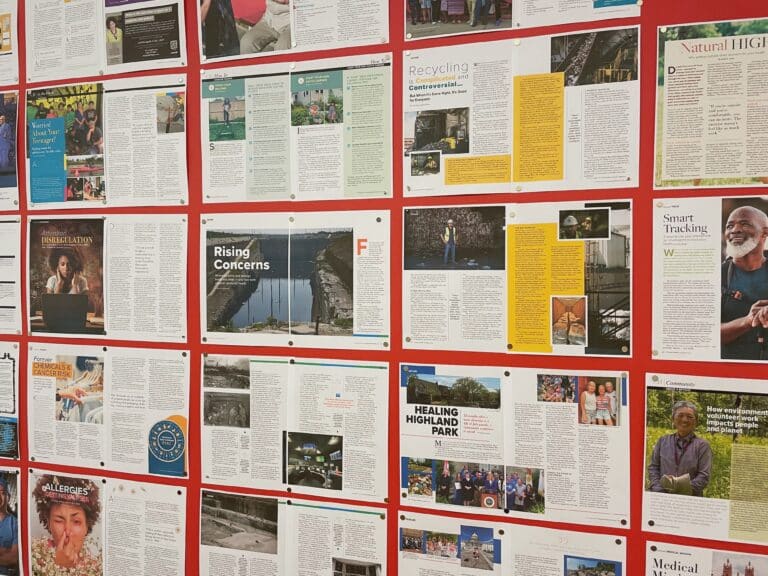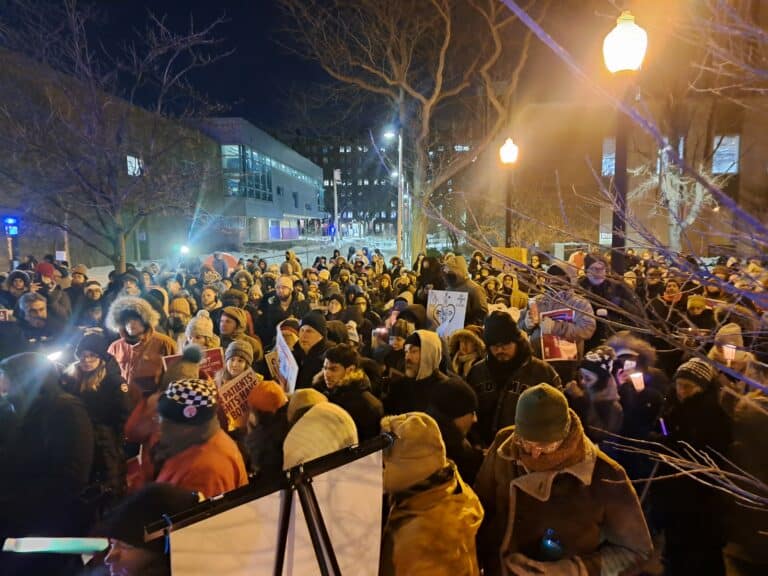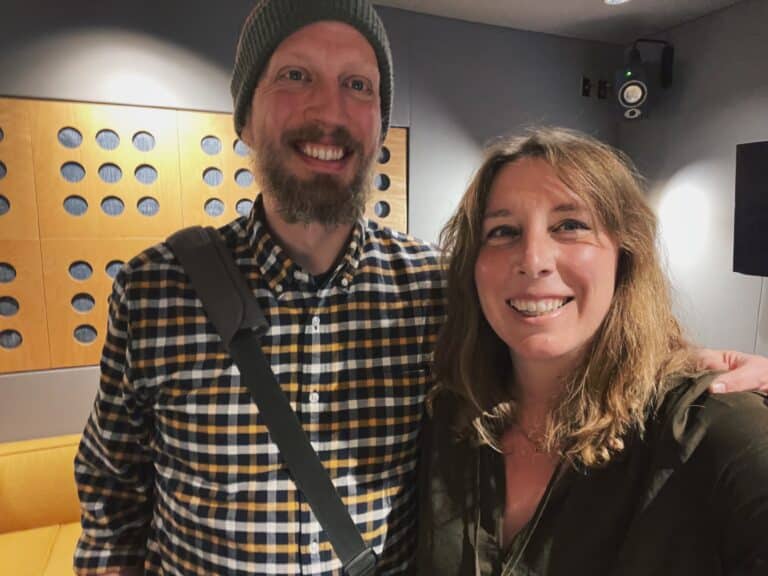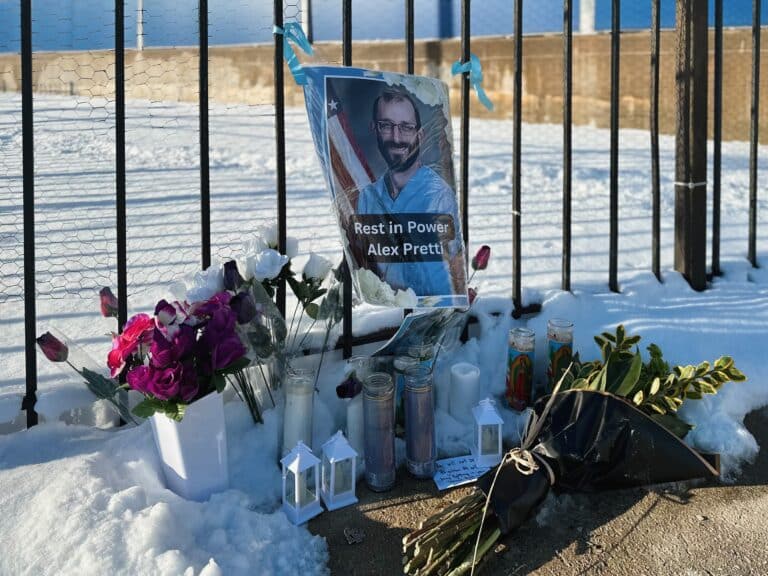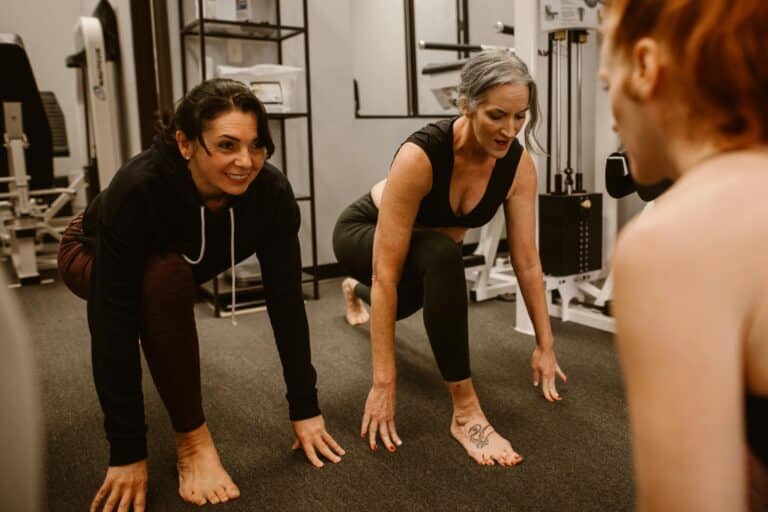18 months after a mass shooting at a 4th of July parade, a community continues to mend
More than a year after the 4th of July parade shooting in Highland Park, where seven people lost their lives and 48 others were wounded, Marcy Kamen, MD, family practice physician at NorthShore Medical Group, is helping people heal. She’s healing herself, too.
“Still today, I am treating people with post-traumatic stress disorder [PTSD],” she says.
Kamen was at the parade with family, a decades-long tradition. She was sitting in front of her 90-year-old dad, resting in his arms, singing “It’s A Grand Old Flag” when shots broke out. A bullet hit her dad in the arm and fatally wounded others near them.
“Right next to me were a couple of my young nieces. I grabbed them and ran to my mom’s house two blocks away, where about 40 people were hiding out,” Kamen says.
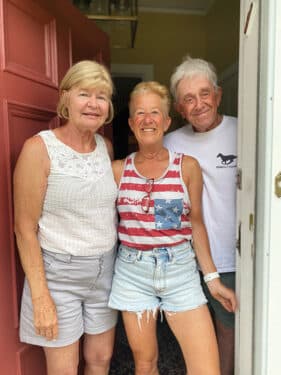
After tending to the wounded and scared in the house, she ran to the Highland Park Library, where more people had taken shelter. “I was hoping I would see my father and my sister, but my sister had already taken him to the hospital,” Kamen says.
Knowing that everyone in her family was safe, Kamen went to work the next day, where she saw 35 patients, a quarter of whom she says were experiencing PTSD from the previous day. Many had been at the parade; others had a connection to Highland Park, such as attending high school there or frequenting the town’s shops and restaurants.
“To experience post-traumatic stress, you don’t have to physically be there,” Kamen says.
She hears stories of her patients’ fears and worries, more than a year later. Kamen has experienced triggers,too, such as hearing sirens or mistaking a cell phone in a person’s hand as a gun. While they abated a few months after the shooting, trauma returned in February 2023 when Kamen’s daughter, who was also at the parade, experienced her second mass shooting while attending school at Michigan State University.
“To know she had been through that twice in one year was very upsetting,” Kamen says.
Coming together to help others
Not far from Kamen’s office, Highland Park Mayor Nancy Rotering continues to grapple with a town in grief. The 30,100 residents are individually and collectively experiencing ongoing trauma, Rotering says. She has had conversations with the U.S. Department of Justice Office for Victims of Crime, which have driven home that the impacts of a one-minute tragedy will echo through lifetimes.
“There is no timeline for how long grief lasts, nor a guideline for how one should feel after a traumatic experience, but as we lean on each other and seek guidance and reassurance from community leaders, we are finding the strength to move forward as individuals and as a community,” Rotering says.
A year and a half later, she says she feels heartbroken by the firsts many families and friends will experience: holidays, birthdays, and milestones either without a loved one or with injuries from the shooting. “The pain felt by so many is not diminishing,” she says.
As Rotering talks with residents, many share that they haven’t returned to the site of the shooting. Still, she says the community will not let the incident define it.
The mayor’s office works with local, state, and federal victims support specialists. Immediately following the shooting, the Federal Bureau of Investigation (FBI) opened a Family Assistance Center at Highland Park High School, which offered mental health services, spiritual care, financial assistance, and more. Some 650 volunteer mental health professionals and other volunteers provided support to more than 3,000 people in need through mid-July, including those who were physically injured or emotionally distressed, regardless of immigration status.
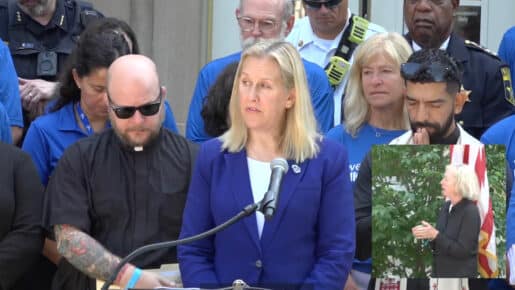
Faith leaders also stepped up to help. Rotering and town officials briefed them on available resources, services, and public safety assistance available to their congregants and houses of worship. “They collectively encouraged all of us to lean on them, as they have been willing and ready to help us recognize and accept our emotions, and guide us towards the tangible, practical things that we can do to ease the path ahead,” Rotering says.
Rotering now is focused on representing Highland Park’s tragedy in hopes of preventing more mass shootings. She has connected with Illinois Governor JB Pritzker, legislators, and advocates to spread the word about the reality of the gun violence epidemic.
“Sometimes hearing the specific, horrific details allows for a better understanding of what happened, how it could happen anywhere, anytime, and why none of us is safe until these weapons are out of the public’s hands,” Rotering says. “My community shares my anger as we work to turn thoughts and prayers into action.”
Rotering worked with other local officials to push for statewide and national bans on certain guns. On January 10, 2023, the statewide assault weapons ban that Illinois legislators had been working on for a decade became law, titled the Protect Illinois Communities Act. The act bans the sale and distribution of assault weapons, high-capacity magazines, and switches in Illinois.
However, organizations including the National Rifle Association, which argues that the law violates the Second Amendment, are challenging it in federal court.
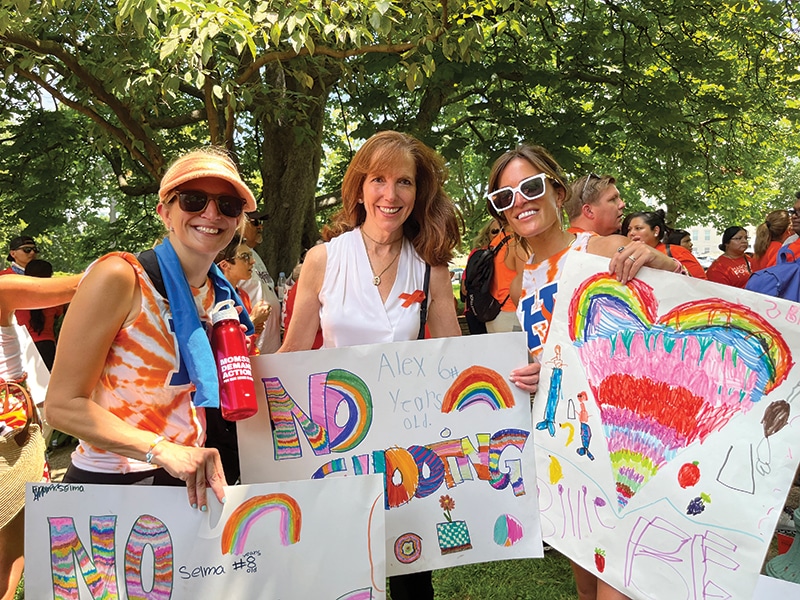
Additionally, a group of mothers from the Highland Park area visited Washington D.C. to urge lawmakers to pass a national ban on assault weapons.
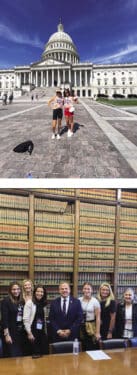
Carolyn Pelissero Moretti of Glenview went to D.C. in July 2022 with the movement March Fourth, organized by a woman in Highland Park. “Most of the people who went were frustrated moms or people in the community. It was pretty inspiring and powerful. After the march, I thought ‘what can we do next?’” she says.
In April, 2023 she returned to Washington with the Joint Action Committee to talk with Congress about assault weapon bans and red flag laws. Her involvement with the committee includes helping to contact people around the country and urging them to vote for candidates who believe in gun control laws. “At the end of the day, if we don’t have representatives in Congress who support common sense gun laws, nothing will change,” Pelissero Moretti said.
Barbara Smith (not her real name) feels the same; however, she advocates in other ways. Smith was in attendance at the parade with her husband and two young children. When she witnessed a man get fatally shot in the head a few feet from her, she covered her children in panic until her husband screamed for her to get up and run. After a two-and-a-half hour walk home, her family found safety.
After the parade, Smith pushed for change. “But I found that the work of constant advocacy is sometimes two steps forward and two steps back. For me, it was not helping me heal. It was making me more paranoid,” Smith says.
Still, she makes a mark in the ways she can by calling senators to share her story of that day and making social media posts. “I have friends who live all over the U.S., and when there are important things up for vote, I’ll call and ask them to make calls to their senators or share the message. I do my part,” she says.
Neighboring Highwood helps Latino community heal
The city of Highwood, home to 5,300 residents, borders Highland Park. Carolina Ibarra Casarubias, of Highwood, was lined up to walk in the Highland Park parade with her church group when they heard gunshots. Thanks to the library’s active shooter training just days before, Ibarra Casarubias ran away from the sound and toward Lake Michigan.
“But all of our cars were parked the other way near the parade route, so it was sometime later that my husband was able to pick us up near the lake,” she says.
Ibarra Casarubias migrated to the area from Mexico 14 years ago. She heard news about gun violence in Waukegan, North Chicago, and Chicago, but she always felt safe in Highwood.
“I never imagined that it would happen in Highwood or Highland Park, and since that day I would never dream of leaving my door open like I used to because I’m not as trusting anymore,” Ibarra Casarubias says.
She says many Latino people living in the area feel the same. “We believed the community to be safe and secure, and that was taken from us. Many people were experiencing anxiety and trauma and did not want to leave their homes,” Ibarra Casarubias says.
As a community engagement coordinator at the Highwood Public Library, Ibarra Casarubias set out to help her community cope. She let people know that the library was offering trauma support groups and therapy sessions, free of charge in Spanish and English. Additionally, a partnership with Consuelo Therapeutic Services assisted in providing weekly individual counseling.
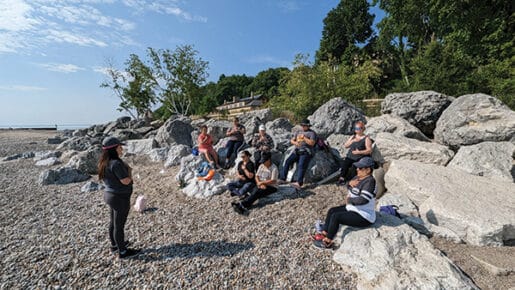
“I was able to attend those sessions, and because they had a Spanish-speaking counselor, that helped,” Ibarra Casarubias says.
She also facilitated sessions, bringing mental health services to more than 900 people using a bicultural/bilingual, trauma-informed approach.
Four months before the shooting, Carmen Patlan, then executive director of the Highwood Public Library, secured a grant from the NorthShore University HealthSystem’s Community Investment Fund to establish a health equity program. This included hiring two full-time clinicians and two full-time case managers.
After the shooting, the need for trauma-informed services was so high the library brought in two additional part-time clinicians. Latino men, women, and children filled the library as soon as the day after the incident.
The library continues to provide support groups once a week, individual counseling, and case management to hundreds of people who otherwise would not have access to support their trauma.
“We are a library. We don’t have a sign above our door that says mental health services, so people feel less embarrassed,” Patlan says.
Because libraries remain one of the few free places in the country that are open to everyone, she says they tend to feel safe and welcoming. “If — through this vessel — we can help people heal, then we’re doing what we’re supposed to be doing. We’re creating an access point that otherwise wouldn’t be available to our specific demographic and the uninsured and under-insured,” Patlan says.
As a result of the Health Equity Initiative through the library, community members have access to free health screenings, vaccinations, health education talks, and counseling. Diana Alvey, lead case manager at the Highwood Library, co-leads the weekly support groups. She says these efforts have inspired acceptance in the Latino community of addressing physical, mental, and emotional health. Over the course of the past 18 months, the heaviness and sense of loss she initially witnessed in people entering the library has lessened.
“I’m really proud of the work that the library has done in destigmatizing mental health in this community and as it does more outreach, to Waukegan, North Chicago, Round Lake, and Mundelein,” Alvey says. “The community has really blossomed and is freer and lighter. It’s powerful to see.”
As community members continue to help each other heal, Kamen does her part as a community physician. She says every effort, whether professionally or personally driven, makes a difference.
“What mostly matters is collaboration and community support of each other in a moment of random tragedy,” she says.
If you need assistance in the Highland Park or Highwood area, call 211 or text 898211 to connect with a trained navigator who can help you access services. Find more resources for survivors and community members at cityhpil.com/resiliency/victims__resources.php
Originally published in the Fall/Winter 2023 print issue.
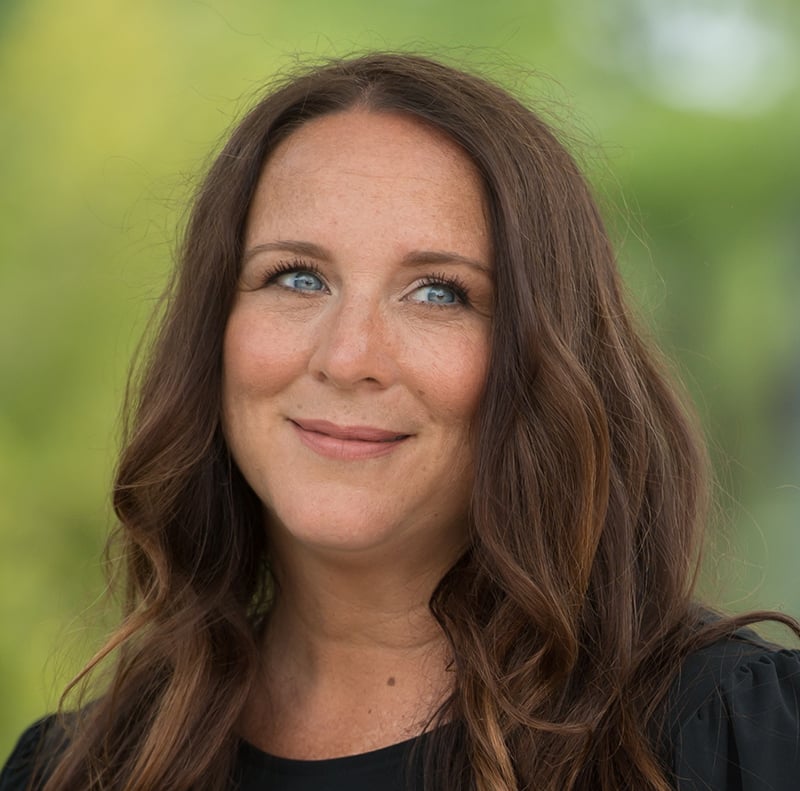
Cathy Cassata specializes in health, mental health, and human behavior. She connects with readers in an insightful and engaging way.

